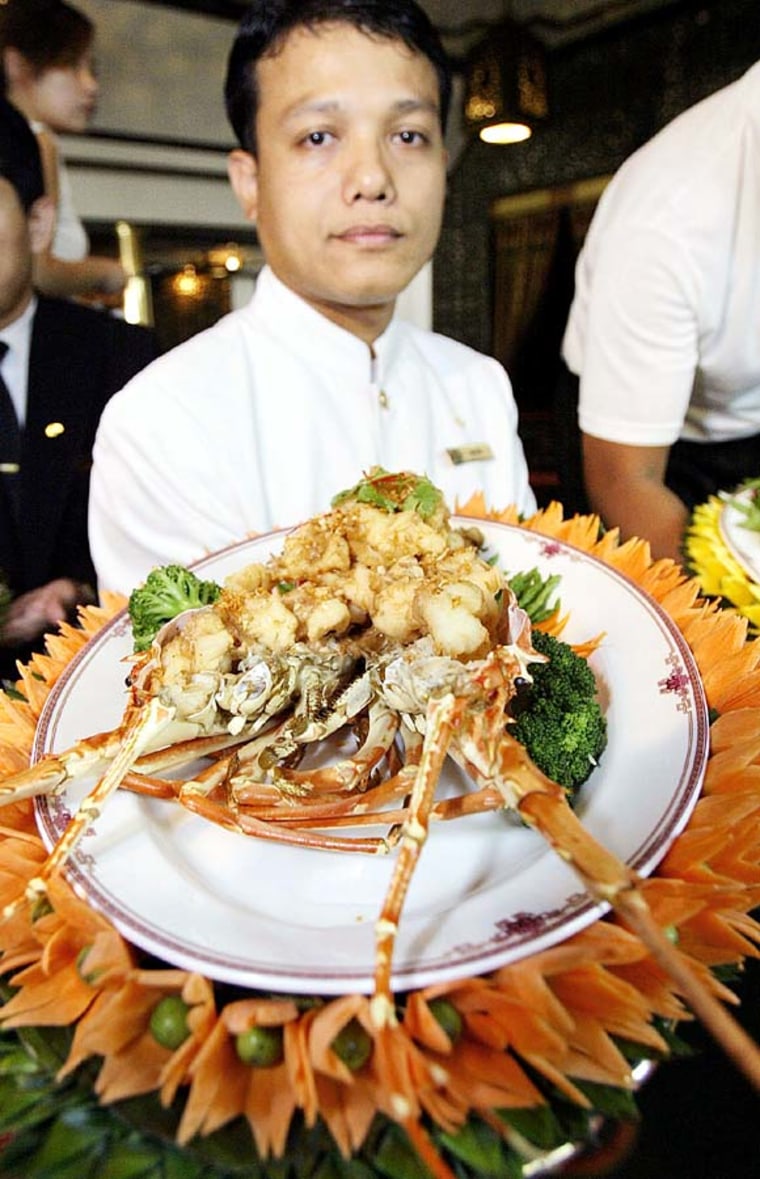Cancel the limo. Put down the dining guides and leave your overcoat in the closet. A power breakfast or lavish business dinner is just an elevator ride away.
In venues from Palm Beach to Paris—bustling financial districts, oceanfront resorts and busy harbors—hotels with internationally acclaimed on-site restaurants are attracting a loyal corporate clientele.
At New York’s Millennium Broadway, executives from publishing, finance and the entertainment industry frequent Restaurant Charlotte, where Chef Aleksandra Parada is known for health-conscious low-carb dishes such as Chilean sea bass and Mediterranean chicken.
“We follow 60 percent trend and 40 percent personal favorites,” said Parada, a University of Warsaw graduate who puts no geographic boundaries on food sources—salmon from Scotland, New Zealand meats, and South American fruits and vegetables.
On Florida’s Atlantic coast, southeastern regional produce drives menu choices for Palm Beach Four Seasons’ acclaimed Chef Hubert Des Marais, whose simply named Restaurant has a Five-Diamond, four-star rating and “a huge number” of local, regional, European and South American repeat guests.
“It’s not just quality of food, china or service, which is always evolving. To be a player, you need to keep pushing. It’s a prestige thing,” said Des Marais, a frequent traveler to Asia, Europe and New York, who conducts tours of his tropical herb and rare fruit garden and greenhouse.
More than the menu
Achieving balance falls to Harry Gorstayn, general manager at Four Seasons, which offers 24-hour business services and will host its second annual Wine and Food Classic Oct. 29.
“It’s more than the menu. It’s the whole evening, the flowers, the surroundings. Creating atmosphere is a financial burden as well,” said Gorstayn, who puts high value on interacting with guests, calling it 80 percent of his job.
In Dallas, The Adolphus hotel’s French Room ranks among the 25 best in the world.
“The majority of clientele fly in from all over—Asia, France and England. George Bush, father and son, have eaten here,” said Executive Chef William Koval.
“I don’t get into the cutting-edge stuff,” the plain-spoken, internationally acclaimed New Englander said. “My trend is not to follow a trend.”
Most chefs and managers see the hotel-restaurant combination as a good thing. Yannick Alleno’s le Meurice in the Hotel Meurice in Paris was awarded two stars from Guide Michelin this year.
In general, the restaurant gets more international exposure because in-house guests from all over the world are introduced to it.
Hyatt International has an enviable crop of chefs creating menus for the discerning taste buds of world travelers.
Chef Sandro Gamba of Park Hyatt Chicago’s NoMi grew up with the aroma of oven-fresh pastry in historic St. Avold in northern France.
Tradition and innovation
“My father baked croissants and my mother sold them,” said Gamba, who likes to keep things simple while staying connected.
“I don’t go on the floor for applause. I go to make people feel like they are in my house,” he said, maintaining that the home kitchen is the “greatest laboratory for cooks.”
Concept, tradition and innovation are part of the success formula.
“Concepts are there for a reason—they work,” said New York Grill Chef Matthew Crabbe at Park Hyatt Tokyo. “Being part of a large hotel chain, attention must be paid to the company’s standards, control systems and work ethic.”
Tradition is a passion for Marco Perez, executive sous chef at Park Hyatt Milano and resident chef of The Park. He studies old cookbooks and adapts recipes to his own “modern Italian” style.
“I also like to research unusual marriages of ingredients, such as natural yogurts or flowers,” said Perez, 80 percent of whose cuisine is based on personal favorites.
Grand Hyatt Tokyo’s German-born Chef Josef Budde’s sweet tooth led him to launch an afternoon dessert buffet at the Hong Kong property, where Marco Avitabile, a German-born Italian, now works culinary wonders.
On the marketing side, Singaporean Jack Aw Yong, executive chef at Grand Hyatt Beijing and 17-year Hyatt veteran, notes: “We consider guest expectations, from a hybrid analysis of international and local guests” leading to a draft menu and trials using local staff and management—expatriates from various countries. A sales analysis follows to further sharpen the menu.
At InterContinental Hong Kong, Laurent Andre, executive chef of SPOON by Alain Ducasse, reports to the high-profile partnership of the hotel and Alain Ducasse Group.
“There are demands to meet the extremely high expectations of both,” he says.
If there is a down-side to the hotel-restaurant combination, it’s fierce competition with free-standing restaurants, said Charlie Sheil, Millennium Broadway's food and beverage director. “We are looking at getting a separate entrance.”
